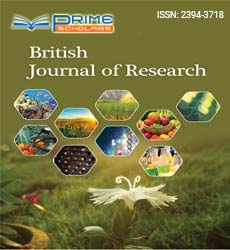Short Communication - (2023) Volume 10, Issue 9
Assessment of Species Warm Affectability with Individual Based Physiological Execution
Yun Wei Dong*
Department of Mariculture, Ocean University of China, China
*Correspondence:
Yun Wei Dong,
Department of Mariculture, Ocean University of China,
China,
Email:
Received: 30-Aug-2023, Manuscript No. IPBJR-23-18003;
Editor assigned: 01-Sep-2023, Pre QC No. IPBJR-23-18003 (PQ);
Reviewed: 15-Sep-2023, QC No. IPBJR-23-18003;
Revised: 20-Sep-2023, Manuscript No. IPBJR-23-18003 (R);
Published:
27-Sep-2023, DOI: 10.35841/2394-3718-10.9.83
Introduction
Physiology, often referred to as the science of life, is a branch of biology that explores the mechanisms and functions that allow living organisms to thrive. It’s a discipline that delves into the intricacies of how our bodies work, from the cellular level to the complex systems that keep us alive and functioning. Physiology has a rich history, with its roots stretching back to ancient civilizations. From the early studies of the Greeks to the pioneering work of William Harvey and the advent of modern experimental physiology, we’ll take a look at the key milestones that have shaped our understanding of this field. To comprehend the science of life, one must be familiar with the core principles that underpin the study of physiology. In this section, we’ll explore concepts like homeostasis, feedback loops, and the relationships between structure and function. Physiology is a multifaceted discipline with various subfields, each focusing on specific aspects of living organisms. We’ll examine the subdivisions of human physiology, comparative physiology, plant physiology, and integrative physiology, highlighting the unique insights offered by each. Human physiology is at the heart of medical science and our understanding of the human body [1,2]. We’ll take a deep dive into topics such as the nervous system, the cardiovascular system, the respiratory system, and more, exploring how these systems work together to maintain our health.
Description
Comparative physiology allows us to explore the diversity of life on Earth. By studying how different species adapt to their environments and unique challenges, we gain valuable insights into the commonalities and variations in physiological processes. Plants may not have muscles or a nervous system, but their physiological processes are just as intriguing. We’ll discuss topics such as photosynthesis, transpiration, and the remarkable ways in which plants interact with their environment. Inte-
grative physiology seeks to understand how different systems work together in complex organisms. We’ll explore examples of integrative physiology, such as the regulation of body temperature, energy metabolism, and the role of hormones in coordinating bodily functions. Physiology has witnessed significant advancements over the centuries. We’ll trace the evolution of our understanding, from early theories of bodily humours to the modern era of genomics and molecular physiology. The study of physiology faces various challenges and ethical considerations, including concerns related to animal experimentation and the use of human subjects. We’ll delve into these issues and explore ongoing debates within the field [3-5]. Physiology plays a pivotal role in the practice of medicine. We’ll discuss how a solid grasp of physiological principles is crucial for diagnosing and treating various medical conditions, and how advancements in physiology continue to improve healthcare.
Conclusion
Beyond the medical realm, physiology has a significant impact on our everyday lives. We’ll examine how our understanding of physiological processes informs dietary choices, exercise routines, and overall well-being. As technology continues to advance, the future of physiology holds exciting prospects. We’ll discuss emerging trends such as personalized medicine, bioinformatics, and the integration of physiology into fields like space exploration and sports science. Physiology is a captivating journey into the science of life. This comprehensive article has taken you through its historical evolution, fundamental principles, diverse subfields, and contemporary developments.
Acknowledgement
None.
Conflict Of Interest
The author’s declared that they have no conflict of interest.
References
- Braschler B, Chown SL, Duffy GA (2021) Sub-critical limits are viable alternatives to critical thermal limits. J Therm Biol. 101:103106.
[Crossref] [Google Scholar] [PubMed]
- Chown SL (2001) Physiological variation in insects: Hierarchical levels and implications. J Insect Physiol. 47(7):649-660.
[Crossref] [Google Scholar] [PubMed]
- Chown SL, Bediako AA, Gaston KJ (2002) Physiological variation in insects: Large-scale patterns and their implications. Compr Biochem. 131(4):587-602.
[Crossref] [Google Scholar] [PubMed]
- Trullas SC, Garcia RA, Terblanche JS, Hoffmann AA (2021) How useful are thermal vulnerability indices? Trends Ecol Evol. 36(11):1000-1010.
[Crossref] [Google Scholar] [PubMed]
- Louthan AM, DeMarche ML, Shoemaker LG (2021) Climate sensitivity across latitude: Scaling physiology to communities. Trends Ecol Evol. 36(10):931-942.
[Crossref] [Google Scholar] [PubMed]
Citation: Dong YW(2023) Assessment of SpeciesWarm Affectability withIndividual Based Physiological Execution. Br J Res. 10:83.
Copyright: © 2023 Dong YW. This is an open-access article distributed under the terms of the Creative Commons Attribution License, which permits unrestricted use, distribution, and reproduction in any medium, provided the original author and source are credited.

